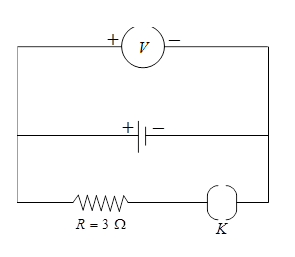Cells, EMF, Internal Resistance
Cells, EMF, Internal Resistance: Overview
This topic deals with the electrolytic cell and electromotive force with an example. It also explains the concept of internal resistance and the charges in the clouds.
Important Questions on Cells, EMF, Internal Resistance
The reading on a high resistance voltmeter, when a cell is connected across it, is . When the terminals of the cell are also connected to a resistance of as shown in the circuit, the voltmeter reading drops to . The internal resistance of the cell is :

A cell of and internal resistance is connected in series with an external resistance . Then, the ratio of the terminal potential difference to is . Write the value of .
Assertion: When a battery is short-circuited, the terminal voltage is zero.
Reason: In the situation of a short-circuit, the current is zero
When a battery is short-circuited, the terminal voltage is zero
The terminal potential difference of a cell when short-circuited is _____.
The terminal potential difference of a cell when short-circuited is (E=EMF of the cell)
The terminal voltage of a cell in open circuit condition _____is its emf.
A cell of and internal resistance is connected in series with an external resistance . Then, the ratio of the terminal potential difference to is -
Derive the expression for the terminal potential difference of a battery of emf and internal resistance which is getting charged.
The potential difference across the terminals of a battery which is getting charged is always:
The terminal potential difference of a battery of emf and internal resistance which is getting charged with electric current flowing through it is:
While charging a run-down battery, current flows inside it from its negative terminal to positive terminal.
Can the terminal voltage of cell be greater than the emf of a cell?
A storage battery of emf with internal resistance is being charged by a supply using a series resistor of What is the terminal voltage of the battery during charging?
In a potentiometer experiment, the balancing length of a cell is 560 cm. When an external resistance of is connected in parallel to the cell, the balancing length chages by 60 cm. The internal resistance of a cell is
A daniel cell is balanced at 125 cm length of a potentiometer wire. When the cell is circuited by a resistance of , the balance length is obtained at 100 cm. The internal resistance of the Daniel cell is
Two cells, having the same emf which are connected in series through an external resistance . Cells have internal resistances and respectively. When the circuit is closed, then the potential difference across the first cell is zero. The value of is:
Assertion: A potential difference measured across cell with a voltmeter is always less than emf of cell.
Reason: Potentiometer is used for emf measurement.
Assertion: In a simple battery circuit, the point at the lowest potential is the positive terminal of the battery.
Reason: The current flows towards the point of the lowest potential, as it does in such a circuit from the negative to the positive terminal.
Assertion: When the cell is in the open circuit, there is no force on a test charge inside the electrolyte of the cell.
Reason: There is no field inside the cell, when the cell is in open circuit.
